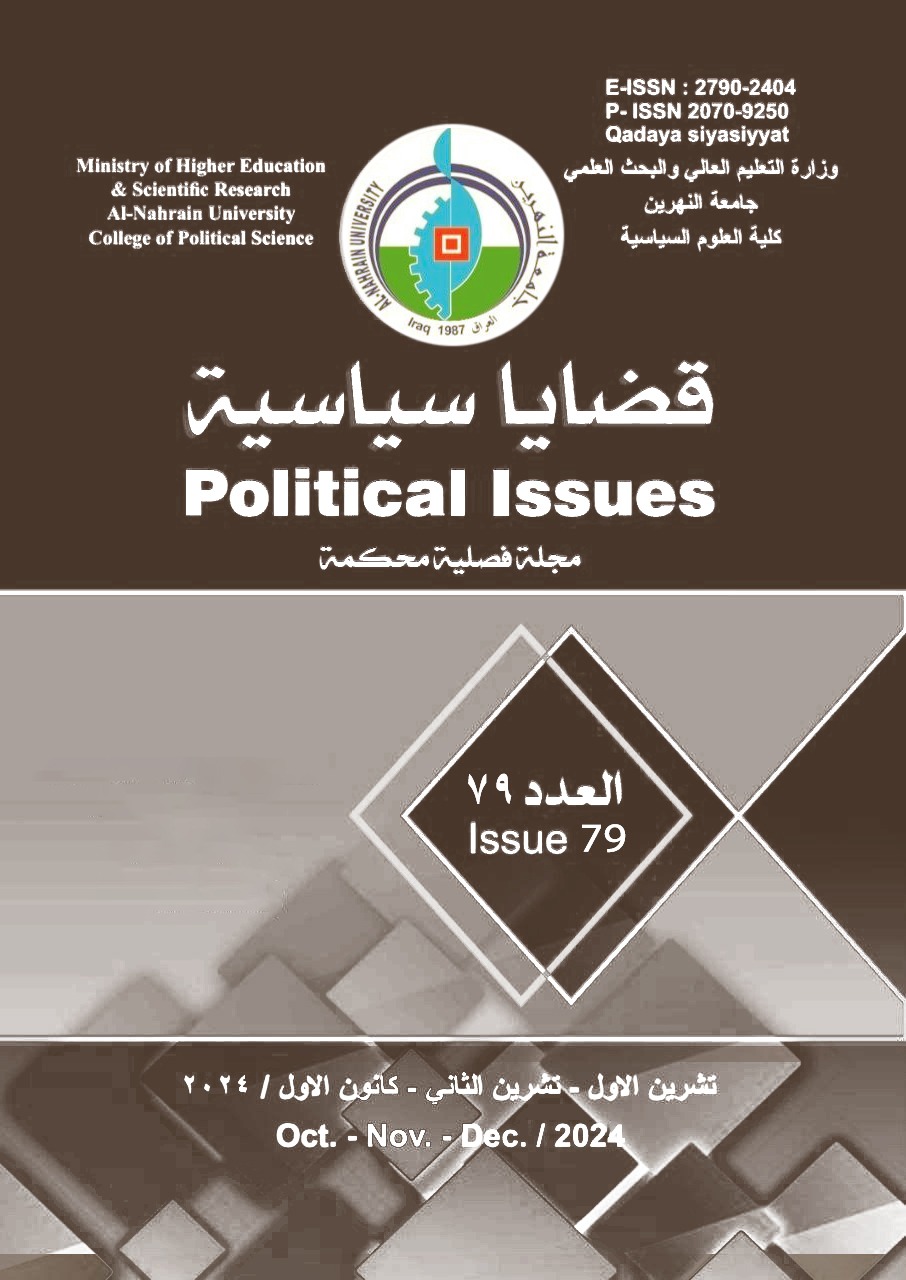واقع ومحددات التداول السلمي على السلطة السياسية في البلدان العربية
DOI:
https://doi.org/10.58298/792024633الكلمات المفتاحية:
التداول السلمي، السلطة السياسية، الاستبداد، البلدان العربيةالملخص
عرفت البشرية عبر تاريخها الطويل أنظمة وأساليب عديدة يصل عن طريقها الحكام إلى السلطة السياسية في الدولة، تختلف باختلاف الحقب التأريخية وقد تنوعت هذه الأساليب ما بين الأسلوب الوراثي المعمول به في الأنظمة الملكية، مروراً بالأسلوب الاستبدادي المتمثل في استخدام القوة والعنف بأشكاله المختلفة ، أو عن طريق البيعة ، أو القرعة التي اُستخدمت في الديمقراطية المباشرة عند اليونانيين وصولاً إلى الانتخاب المعمول به في الكثير من النظم الحديثة، لكن الواقع السياسي العربي يشير إلى استبعاد مسألة التداول على السلطة، إذ لم تشهد أغلب البلدان العربية الانتقال الحقيقي للسلطة بشقها التنفيذي باستثناء كل من لبنان والعراق بعد عام 2003م، وعليه فإن محنة انتقال السلطة في العالم العربي ليست نتاج ظرف بعينه أو متغير منفرد، وإنما هي حصيلة لتفاعل جملة من العوامل والظروف التاريخية والسياسية والاقتصادية والاجتماعية والثقافية التي أوجدت المستبد وأدامت له أسباب البقاء على سدة الحكم.
المراجع
Ibn Manzur - Muhammad bin Makram. Lisan al-Arab, 1st ed., vol. 11 (Beirut: Dar al-Sadir, 1976), p. 252.
Michael Stewart. Modern Governance Systems, translated by Ahmed Kamel, reviewed by Suleiman al-Tamawi, (Beirut: Dar al-Fikr al-Arabi, 1962), p. 309.
Salah Salem Zartouqa. Patterns of Seizing Power in Arab Countries, (Egypt: Madbouly Library, 1993), p. 64.
Thanaa Fouad Abdullah. Mechanisms of Democratic Change in the Arab World, (Beirut: Center for Arab Unity Studies, 1997), p. 181.
Mundhir al-Shawi. Constitutional Law: Theory of the Constitution, (Baghdad: Legal Research Publications, p. 1981), p. 2.
Sadiq al-Aswad. Sociology - Its Foundations and Dimensions, (Baghdad: Dar al-Hikma for Printing and Publishing, 1990), p. 276.
Muhammad Kazim al-Mashhadani. Political Systems, (Mosul: Dar Al-Hikma for Printing, 2008), p. 159.
Hassan Shafiq Al-Ani. Political and Constitutional Systems, (Cairo: Al-Atik for Book Industry, 2007), p. 270.
Ahmed Ayman Majd Al-Din. The Principle of Rotation of Power in Algeria, (Algeria: Master's Thesis, Faculty of Law and Political Science, University of Qasdi Merbah - Ouargla 2015), p. 24.
Yahya Al-Sayed Sabahi. The American Political System and the Islamic Caliphate, (Cairo: Dar Al-Fikr Al-Arabi, 1993), p. 119.
George Shafiq Sari. Principles and Provisions of Constitutional Law, 4th ed., (Cairo: Dar Al-Nahda Al-Arabiyya, 2003), p. 747.
Ali Youssef Al-Shukri. Comparative Political Systems, (Egypt: Itrak for Printing and Publishing, 2003), p. 97.
Souad Al-Sharqawi. The Political System in the Contemporary Year, Dar Al Nahda Al Arabiya, Cairo, 2002, p. 55.
Abdul-Ilah Belqiz. Violence and Democracy, 2nd ed., (Beirut: Dar Al Kunuz Al Adabiya, 2000), p. 14.
Saleh Hussein Ali. Election as a Democratic Method for the Transfer of Power, (Cairo: Dar Al Kotob Al Qanuniya, 2001), p. 293.
Hassan Muhammad Shafiq. Comparative Political and Constitutional Systems, (Cairo: Dar Al Aatek, 2007), p. 270.
Maurice Duverger. Political Institutions and Constitutional Law, translated by (George Saad), (Beirut: Majd University Foundation for Publishing and Distribution, 2014), p. 40.
Falah Khalaf Kazim Al Zuhairi. Democracy and the Peaceful Transfer of Power - The Inevitability of Interdependence, Political and International Magazine, Issue 22, (College of Political Science, Al Mustansiriya University, 2012), p. 223.
Bourhala Qadriya. Peaceful Transfer of Power, Journal of Political and Administrative Research, Issue (6), (University of Ziane Achour, Djelfa, Algeria, 2016), p. 62.
Saad Eddin Ibrahim and others. The Crisis of Democracy in the Arab World, 3rd ed., (Beirut: Center for Arab Unity Studies, 2002), p. 84.
Oswaldo de Rivero. The Myth of Development and the Hidden Forces of Destruction, The Extinction of the Third World, (translated by Fatima Nasr), (Cairo: Sutour Al-Jadeeda Publications, 2002), p. 22.
Ghassan Salama and others. Democracy without Democrats, Openness Policies in the Arab Islamic World, (Beirut: Center for Arab Unity Studies, 1995), p. 592.
Jumaa Al-Zarouk Faraj. The Role of the Tribe in Arab Political Systems, Yemen as a Model, (Jordan: Master’s Thesis, Middle East University, Faculty of Arts 2015), p. 90.
Wamdi Jamal Omar. Features of Arab Thought in the Age of Awakening and Its Relationship to the Idea of Arab Nationalism, Al-Mustaqbal Al-Arabi Magazine, Issue 52, (Beirut: Center for Arab Unity Studies, 1983), p. 71.
Burhan Ghalioun. The Arab Ordeal: The State Against the Nation, 1st ed., (Qatar: Arab Center for Research and Policy Studies, 2015), p. 226.
Wamdi Jamal Omar. Features of Arab Thought in the Age of Awakening and its Relationship to the Idea of Arab Nationalism, Al-Mustaqbal Al-Arabi Magazine, Issue 52, (Beirut: Center for Arab Unity Studies, 1983), p. 71.
Qahtaan Ahmad Suleiman. The Basis of Political Science, 1st ed., (Amman: Dar Majdalawi, 2004), p. 311.
Hussein Tawfiq Ibrahim. The Phenomenon of Political Violence in Arab Regimes, 2nd ed., (Beirut: Center for Arab Unity Studies, 1999), p. 136.
Imam Abdul Fattah Imam. The Tyrant: A Philosophical Study of Forms of Political Tyranny, (Kuwait: World of Knowledge Series, National Council for Culture, 1994), p. 161.
Sari Hashim Muhammad. The Crisis of Democracy in Arab Countries and Its Impact on Unity Projects, (Al-Mustansiriya University: Master's Thesis, Higher Institute for Political and International Studies, 2004), p. 15.
Abdul-Ilah Balqiz. Political Reform in the Arab World, Al-Mustaqbal Al-Arabi Magazine, Issue 304, (Beirut: Center for Arab Unity Studies, 2004), p. 87.
Samir Mu'ayyad Abdul Latif. The Crisis of the Peaceful Transfer of Executive Power and the Future of Change in the Arab World, Issue 2, University of Karbala - College of Law, 2016, p. 146.
Abdul Nour Bin Antar and others. Democracy and Democratic Development in the Arab World, Al-Mustaqbal Al-Arabi Book Series (30), (Beirut: Center for Arab Unity Studies, 2012), 59.
Fateh Samir Azzam. The Constitution in the Arab World: Factors of Stability and Foundations of Change, (Beirut: Center for Arab Unity Studies, 2006), p. 72.
Ali Al-Din Hilal and Nevin Mas'ad. Arab Political Systems: Issues of Continuity and Change, (Beirut: Center for Arab Unity Studies, 2002), p. 61.
Mundhir Suleiman. The Army, Politics and Authority in the Arab World, (Beirut: Center for Arab Unity Studies, 2002), p. 168.
Osama Al-Ghazali Harb. Political Parties in the Third World, (Kuwait: Alam Al-Ma'rifah, 1978), p. 75.
Abdul Rahman Al-Kawakibi. The Nature of Tyranny and the Downfall of Slavery, 2nd ed., (Edited by Muhammad Amara), (Cairo: Dar Al-Shorouk, 2009), p. 115.
Charles Issaoui. The Economic and Social Conditions of Democracy in the Middle East, Al-Mustaqbal Al-Arabi Magazine, Issue (322), Center for Arab Unity Studies, Beirut, 2005, p. 13.
Ahmad Fadel Jassim. Political Transformations in Arab Countries: An Analytical Study of the Causes and Future Prospects, Political Science Magazine, Issue 47, College of Political Science - University of Baghdad, 2013, p. 83.
Ismail Al-Shatti and others. Approaches to the Transition to Democracy in Arab Countries, 2nd ed., (Beirut: Center for Arab Unity Studies, 2004), p. 332.
الملفات الإضافية
منشور
إصدار
القسم
الرخصة
الحقوق الفكرية (c) 2024 محمد محي الجنابي

هذا العمل مرخص بموجب Creative Commons Attribution 4.0 International License.
هذه هي مقالـــــة منشـــــــــورة بنمط الوصـــــول الحـــــــر ومـــــــوزعة تحــــــت شــــــروط ترخيص المشاع الابداعي نسب المصنف (CC BY) 4.0 دولي التي تسمح بالاستخدام غير المقيد، التوزيع، واعادة الانتاج في أي وسيط أو صيغة، والتحوير أو البناء على المادة، بما في ذلك للأغراض التجارية، شريطة أن يتم نسب العمل للمؤلف الأصلي.






